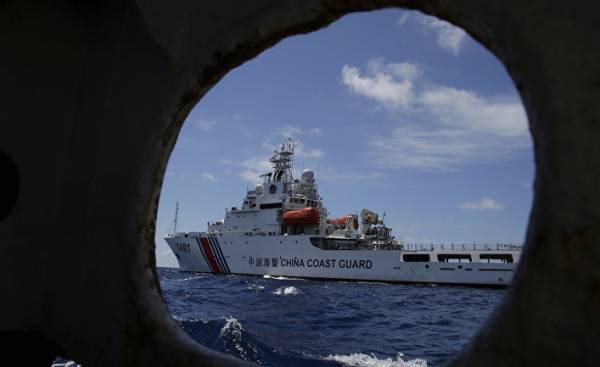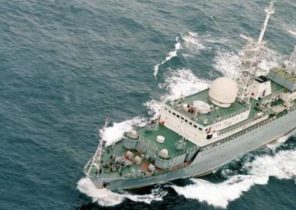
No matter how it seemed on the Ukrainian bell that the line deployed a global conflict between the US and Russia, in Washington, it seems that the role of the opponent “number one” reserved for China. Simultaneous deter both excessive problem even for such a superpower as the United States.
But because the choice is determined by two fundamental points: which requires immediate intervention in order to prevent excessive strengthening of the enemy and where possible to achieve wide public acceptance of the new administration of the President of the United States. Because, as you know from the last century — “to hold a revolution, we need a small victorious war.”
Mix of pragmatism and ideology
The first steps of the administration trump against China inspire a lot of anxiety. The reason for this is the neglect of the new President of common sense and the intention to go on a serious deterioration of relations with China is a strong enemy, which, moreover, the United States ties of economic interdependence. But who would argue that the conflict is always the most logical choice? The most serious reason for a tough US approach to China is the fact that over the last decade China economically and militarily strong enough to be able to challenge their leadership. Delay in containment will give him time to amass even more. China fits the role of main rival because today, in contrast to the situation twenty years ago, the two countries have a much longer list of problems in the relationship, the resolution of which through diplomacy, it is hardly possible: the conflicts in the South China and East China seas, North Korea, the opacity of the military modernization of China, especially in the segments of strategic, space and cyber weapons.
It is easy to assume that a significant deterioration of relations with neighbors, allies and the rest of the world, demonstrating now the US, due to reasons internal. The output of the TRANS-Pacific partnership (TPP) or a large-scale trade war with China to trump clear signals to voters about his intention to implement his election program. And in it, among other things, of seven points on the economic revival of America three is directed against China. Now emerging foreign policy strategy trump the geopolitical issues linked with trade relations of America. The new administration intends to consider the behavior of other countries in matters of defence and security in conjunction with economic relations. Although in this case it is possible to notice that the cart is put before the horse. Conflict with China is still only a threat, and the Pentagon already has ambitious plans to increase the naval forces of the United States. According to them, in the coming years, the total number of ships of the American fleet will increase to 355 units.
There are not so many countries, against which a military build-up may be adequate. From the perspective of the Chinese leadership’s domestic political situation is also decisive. The only difference is that steering China primarily seek to preserve stability and to consolidate his power before the fall of the XIX Congress of the Communist party of China, which will identify key development objectives for the next five years. The rapid deterioration of relations with the United States will not be the winning position for the Chinese leader XI Jinping. Indeed, the rapid growth of China — a direct result of the openness of the Chinese economy and positive relations with the West. The increase in trade conflicts with the United States maybe even in the short run to affect the stability of the Chinese regime. In the long run will lead to increasing isolation from the West, deepening authoritarian tendencies within China and, as a consequence, to an increase in internal discontent. How profitable you can use the external threat for domestic political purposes — well known as authoritarian leaders, and quite democratic.
Only authoritarian, once started, difficult to stop. In addition, there is a clear example of Russia, in real time, proving that the “battle of the TVs” from the point of view of strategy is no less important than in reality. Thus, the potential escalation of the conflict between the two countries is the military-strategic balance of forces in the Pacific, and bilateral economic relations. Of course, the first option seems more dangerous, because from the military perspective. But it is also clear that these tensions can fuel each other. Besides, how the parties are willing to go to drastic measures, can largely be judged by the political situation.
Fragile regional peace
One of the pillars of US foreign policy was for decades the non-proliferation of nuclear weapons, and apparently is the only thing that trump is not going to reconsider their approaches. With regard to the relations with China it is, first and foremost, minimize the nuclear threat of North Korea. Trump believes that China is not doing enough to put in place presumptuous mode seeking in the coming years to get into service Intercontinental ballistic missile: 12 February, North Korea conducted another test of a ballistic missile, which Pyongyang official called successful.
The six-party talks with North Korea “SAG” all the time under the Obama administration, and to date, Pyongyang has no interest in their resume. China remains the main sponsor of the regime of Kim Jong-UN. However, Pyongyang could create a significant problem to China. Provocation by North Korea carries huge risks of creating a broad coalition against it in the US, Korea and Japan. Based on the disadvantages of this scenario for Beijing, he will do anything to keep the DPRK regime from possible conflict. In addition, in response to the DPRK nuclear issue, Washington and Seoul plan to place in South Korea missile complex rolling land-based THAAD. This complex parties are considered as the antidote to the threat of Pyongyang. But China sees this as the beginning of a wider placing of strategic weapons the United States in Asia.
Control of the waters of the South China morealready most explosive issue and a possible collision of the armed forces of the United States and China.The essence of the controversy boils down to the fact that the US is defending the principle of freedom of navigation, providing the US as the strongest naval power, strategic advantage, and China is trying to assert their exclusive rights to the waters. There are Parabelskiy archipelago and Spratly Islands, control of which means control over all trade and transport flows between the Indian and Pacific oceans. Each year on this waterway transported goods worth $ 5.3 trillion. Half of goods are oil and oil products.
Also, if war occurs in Asia, military presence in the Spratly Islands can be effectively used to block all sea passages in the South China sea. Of course, for China, claiming the status of a global power, an extremely important and strategic military factors, and ensure uninterrupted energy supplies. Increasing military activity in the waters was particularly noticeable in recent years. China is rapidly building its own Navy, and to justify their territorial claims puts artificial Islands.
Those, access to which, according to Secretary of state Rex Tillerson needs to be blocked for China. Beijing also boosts the construction of a second aircraft carrier, which will be based in the South China sea. To maintain a balance of power in the region, the United States periodically send their destroyers to ensure freedom of navigation. Their ally Japan equips the Philippines and Vietnam warships to strengthen their marine defense capabilities in the face of potential conflict with China. The problem, however, is that both South-East of the country are going to be friends with China than to fight. A positive agenda prevails in relations Beijing as the official Manila and Hanoi.
Among other pressing issues — the situation in the East China sea — a dispute between China and Japan about the territorial affiliation of the Senkaku Islands (Diaoyu). Although Chinese and Japanese leaders to refrain from coercive control over the Islands, unauthorized actions of commanders on the ground can lead to unintentional escalation of the conflict. For example, on 10 February in the sky over the South China sea dangerously close two aircraft American military aircraft P-3 and a Chinese military aircraft. Both aircraft passed each other at a distance of 300 meters. Obama as President has stated that the disputed Islands covered by the security Treaty between the United States and Japan. Thus, even an accidental incident may involve US in a military confrontation with China.
Asian Union: high price, low expectations
In Asia, unlike Europe, there is no system of collective security. Instead the international order rests on the bilateral alliances with Japan, Republic of Korea, the Philippines, Australia, Thailand. The main drawback of these alliances for the United States that in the case of a regional conflict, the States will have to intervene, but if it comes to conflict between Washington and Beijing and their allies can refrain. In accordance with the provisions of the North Atlantic Treaty, article 5 is valid here only for the US. Such a unilateral consumption security could not be indifferent to the trump.
Hence its pressure on Asian allies to demand not only reduce the cost of cooperation, but also to reconsider the nature of the relationship. For this not chosen the most opportune moment. Among the allies there is confusion and vacillation. Prime Minister Shinzo Abe, who has made significant policy efforts to promote the TRANS-Pacific parterstva (TTP) and a great friend Obama was forced to abruptly change course after winning trump. In South Korea lasts political crisis, and among the possible successors of the President, forced to resign over a corruption scandal, is in agreement on the need to strengthen friendship with China and more conciliatory policy towards North Korea. Australia, on the one hand fears the reduction of the US presence in the region, on the other she was concerned that a possible deterioration of regional security will affect its economic ties with China. In the Philippines, the President of Duterte generally becomes almost the closest ally of Beijing.
Contracts for billions of dollars, signed by the countries in recent years, helped soften even disagreements over the disputed Islands in the South China sea. It is obvious that in recent years China has been an economic magnet for the region, which at the same time dependent on USA in security matters. The answer to the question “do you support the allies of the American effort against China?” depends on what it was to begin the conflict. Taking into account the interests and relationships in the region, we can assume that if the cause of the conflict will come from the North Korean regime, then it will be absolutely involved South Korea and Japan. Tokyo is also one of the parties to the conflict over Islands in the East China sea. If out-of-control situation in the South China sea, the United States will be able to count on a more or less broad coalition of countries from the ASEAN.
But in General the escalation of tension in the region is not profitable for any of the regional countries, since they are all more focused on the development and deepening of economic relations, both among themselves and with China. Against that backdrop, it is imperative for US to ensure Russian neutrality in the unfolding confrontation with China. It can be done, for example, by removing from the Moscow part of the sanctions adopted since 2014, and recognition for her role as a regional leader. At the moment relations between Russia and China seem robust. The parties support each other in the UN security Council, Russia supplying China with weapons, as was recently conducted joint exercises in the South China sea. But Russia certainly weighs the fact that in this pair she can’t claim the role of main partner.
During the cold war the main adversary of the US was the Soviet Union, and the United States considered the option of separation from China as a way of weakening the USSR. This was the plan of Henry Kissinger, quite successful. The similarity with the current situation are striking — on the stage of the same, to the extent that Kissinger is advising trump, but the actors have changed places, and now their task, see US apart Russia from China. Preserved a conversation between Nixon and Kissinger, which took place just before the historic turn in relations between the US and China in 1972: President’s Advisor says “compared to Russians, the Chinese no less dangerous, and in a historical perspective even more. Twenty years later, your successor will bow down to Russian vs Chinese.” The only thing not guessed “clever kitty” is a date. The Americans were much more patient.
Protectionism, aiming yourself in the foot
Since the first days in office, trump and his team use a fairly aggressive rhetoric against China. The reanimation was descended in the period of Obama’s “China threat” the return of the idea of containment of China. Trump has already announced a possible revision of long-term policy of recognizing one China (however, last week the White house was quick to announce that its head has promised XI Jinping to respect the principle of the existence of “one China”), accused Beijing of manipulating its exchange rate and predatory approach to bilateral trade.
Team to guide the process trump forms is also based on selection of the most outspoken critics of China. It includes the head of the trade Council Peter Navarro, as well as nominated for the post of trade representative and the Minister of Commerce Robert Latenser and Wilbur Ross. All three of them are in positions of protectionism and protect the American manufacturer. Their task will consist in defending claims against China to the WTO, and as a more immediate decisions — a significant increase tariffs on certain imported Chinese goods. In accordance with the Law of the international emergency economic powers 1977, the President was delegated authority in the case of “emergency” to impose selective tariffs and quotas without the consent of Congress. A decree on the withdrawal of the U.S. from the TRANS-Pacific partnership, trump has dealt with the Treaty, embodying Asian twist Obama.
The agreement stipulated a reduction of trade tariffs between the 12 countries, including USA, Japan, Canada, Mexico, and would cover at least 40% of the world economy. But its main feature was the exclusion of China, which gave reason to see the TTP political project of containment of the regional economic dominance of Beijing. The Chinese leadership was aware, against whom is this contract. The project “One belt, one road”, which is now actively talking and Ukraine, was launched as a counterbalance to the TPP and the project of economic integration around China. For this purpose, China created the Asian infrastructure investment Bank, with an eye to the future make it a regional alternative to the world Bank.
Both projects were in the past two years. Trump’s decision to leave TTP was seen in Beijing with mixed feelings. On the one hand, it is obvious that without the US, the TPP is meaningless, and that means China has nothing to fear that regional economic integration will occur without his participation. On the other, although protectionist measures were in two countries before, the current trading phase of the confrontation may prove to be a turning point. To assess the scale of possible consequences for regional and global trade for the following data. Last year, the trade flow between the U.S. and China amounted to 660 billion dollars.
Over the past 25 years, the US has invested in China more than 230 billion dollars (according to a report by Rhodium Group and the American NGO “national Committee on U.S.-China relations,” (NCUSCR)), creating half a million jobs. Chinese investment in the United States — a recent phenomenon, but growing very quickly — $ 65 billion and 100 thousand jobs in the United States, respectively. China is one of the most dynamically developing export markets in the US, and literally every big American Corporation has its office. Most of the American equipment is made in China, also from China, the U.S. exported a variety of items available. Obviously, a trade war will hurt both in the us manufacturer and the buyer. Deterioration of relations will not only affect trade.
The largest number of foreign students in the United States today accounts for the Chinese. Their opinion will be a severe blow to the American universities. The rise of protectionism and the growing political distrust increase the potential for conflict between the US and China, making the peaceful resolution of disputes problematic. If the United States will defend the maximalist position — stepping simultaneously on the economic, and naval fronts, the differences will grow, until it will lead to direct conflict. China will do everything possible to prevent the formation of a broad regional coalition against him, his tactics will be to attempt to “pull” from the US as many countries as possible or to obtain their neutrality. However, both countries will not be able to avoid the temptation to use the growing conflict in domestic politics, which will lead to greater nationalism.







